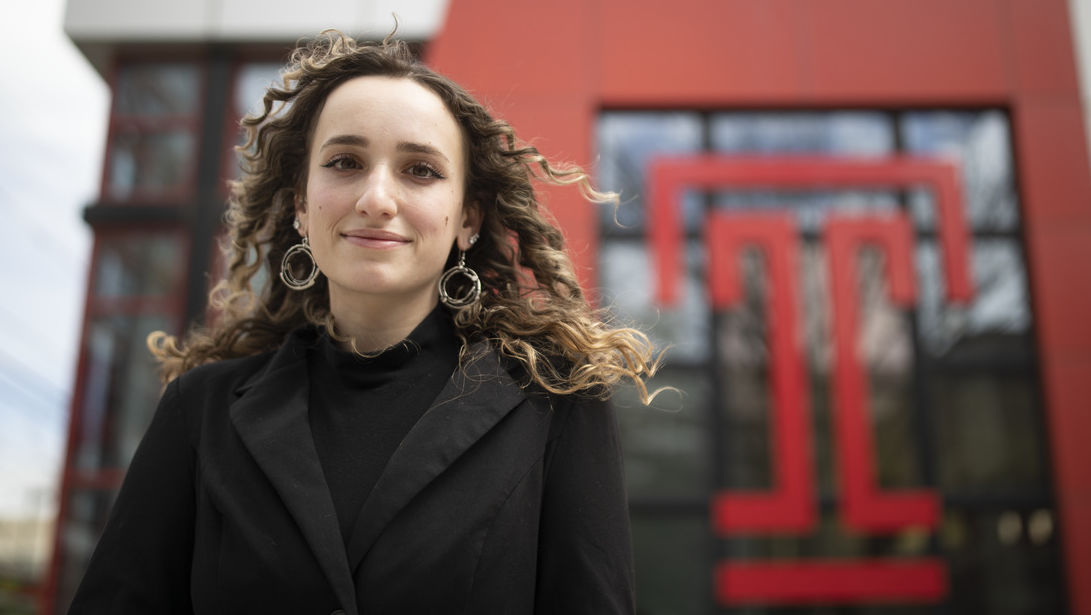Student activist Ray Epstein receives prestigious 2024 Truman Scholarship
Epstein, the new student government president, is the sixth Temple student to receive the national honor.

Just 24 hours after completing the most arduous interview of her young career, Ray Epstein, Class of 2025, became the sixth Temple University student to receive the prestigious Truman Scholarship for outstanding leadership potential in public service.
As part of the scholarship, Epstein, who is well known on campus for her activism on preventing sexual assault and supporting its victims, will receive a $30,000 award toward a public service-related graduate degree, an amount that can be matched by her chosen higher education institution as she pursues a law degree.
Epstein is a double major, studying English in the College of Liberal Arts and communication and social influence at Klein College of Media and Communication. She hopes completion of law school will allow her to write and enable sexual assault survivor reporting legislation, continuing work she has led at Temple. She is also the newly elected president of Temple Student Government for 2024-25.
“Ray Epstein demonstrates dedication to academic excellence, leadership and commitment to making a positive impact,” said Temple President Richard M. Englert. “She exemplifies the values we strive to instill in our students and her achievement is an inspiration to our entire Temple community. We are immensely proud of her accomplishments and look forward to witnessing the remarkable contributions she will undoubtedly make as a Truman scholar dedicated to public service."
Epstein found the grant program online in October 2023 and contacted Barbara Gorka, director of scholar development and fellowships advising. Gorka helped guide Epstein through the application process, including preparing a letter of support from Temple University and recommendations from several educators, including professors Daniel Silverman in criminal justice and Laura Sinko for nursing and public health. She also assembled an all-star team to assist with Epstein’s interview preparation: CLA Dean Richard Deeg; English Department Chair Roland Williams; then-interim Title IX coordinator Rosa Parks-Green; Professor Elizabeth Taylor of the School of Sport, Tourism and Hospitality Management; and Klein Professor John Matthews.
“We set up her practice interviews to be intimidating with questions asked by department chairs and deans, and Ray was able to respond to every question without hesitation and with concrete evidence to support her argument, over and over again,” Gorka said. “I had not seen a student interview this well.”
Epstein also credited Matthews’ lessons in public speaking with helping her achieve a noteworthy interview that led to her selection five months after she began the application. She said the crucial final interview for the scholarship came on April 3 at a Washington law firm within eyesight of the White House.
“It was such an overwhelming interview and the hardest thing I have ever done. I wasn’t sure how well I did,” Epstein recalled. “I wrote about a ruling by the Connecticut Supreme Court related to Title IX. The goal of the interview is to see if you will hold to your ideas.”
Matthews said that as a professor, it was rewarding to work with a young person who wants to give back to her community: “She is giving back now and when you look at her work on campus, you can see it. She is exceptional. She is a dedicated person,” he said.
Provost Gregory N. Mandel gave Epstein the good news of her award in an impromptu meeting coordinated by Gorka in Founder’s Garden at O’Connor Plaza. The award was established by Congress in 1975 as a living memorial to President Harry S. Truman to support and inspire the next generation of public service leaders. When approached by a bipartisan group of admirers near the end of his life, President Truman asked Congress to create a living memorial devoted to this purpose rather than a traditional brick-and-mortar monument. For almost 50 years, the Truman Foundation—an independent agency in the White House complex—has fulfilled that mission: inspiring and supporting Americans from diverse backgrounds to public service, according to information from the program.
Epstein’s activism is part of her campus life. She is the founding president of Student Activists Against Sexual Assault (SAASA) and vice president of Planned Parenthood Generation Action at Temple. She is also running for president of Temple Student Government. With SAASA, she already has helped Temple’s Wellness Resource Center receive a $20,000 Pennsylvania Department of Education’s It’s On Us PA grant, which funds resources to improve sexual assault awareness and prevention.
“In starting Student Activists Against Sexual Assault, I quickly had to learn the law, specifically Title IX,” Epstein said. “In my daily life, I support students by connecting them with pro bono legal counsel and informing them of their rights. I have learned to read case law with the help of criminal justice professors like Daniel Silverman, who taught Sex Crimes in the Law. I feel well-prepared to enter the next chapter in my life by attending law school.”
Epstein, whose family lives in Maryland, is among this year’s 60 awardees who join a community of 3,564 Truman Scholars named since the first awards in 1977. Truman Scholars demonstrate outstanding leadership potential, a commitment to a government or nonprofit career, and academic excellence. Each Truman Scholar receives funding for graduate studies, leadership training, career counseling, and special internship and fellowship opportunities within the federal government, the program noted.
This year’s scholars were selected from 709 candidates nominated by 285 colleges and universities. They were recommended by 17 independent selection panels based on the finalists’ academic success and leadership accomplishments and their likelihood of becoming public service leaders. Regional selection panels included distinguished civic leaders, elected officials, university presidents, federal judges and past Truman Scholarship winners.